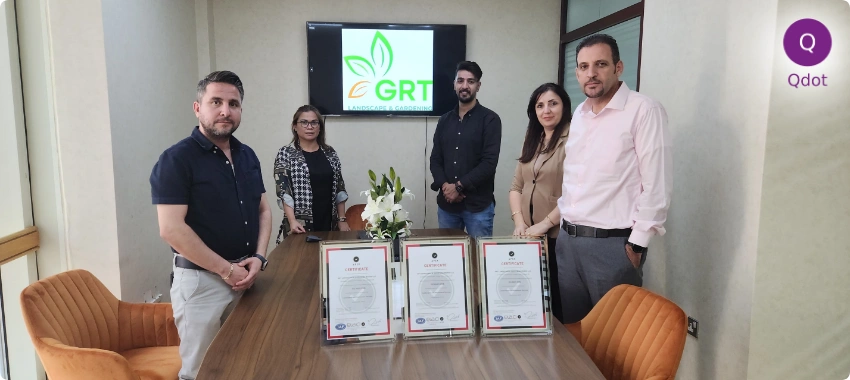
ISO certification is a globally recognized mark of excellence that demonstrates your organization's adherence to internationally recognized management standards. In Pakistan, businesses across various sectors, including manufacturing, services, exports, healthcare, construction, and food, rely on ISO certification to enhance quality, credibility, and compliance.
Qdot delivers complete ISO certification services in Pakistan, helping organizations implement effective management systems that meet international benchmarks and real business requirements.
As a trusted ISO certification consultant in Pakistan, Qdot ensures your certification journey is structured, transparent, and results-driven.
What Is ISO Certification in Pakistan?
ISO certification in Pakistan is a formal recognition that an organization complies with standards issued by the International Organization for Standardization (ISO). These standards define best practices for quality management, environmental responsibility, workplace safety, information security, energy efficiency, and food safety.
ISO certification involves implementing documented systems, training teams, conducting internal audits, and passing an independent certification audit conducted by an accredited certification body.
In Pakistan, ISO certification is widely used by organizations to:
- Standardize processes and improve operational control
- Demonstrate compliance with international quality and safety benchmarks
- Build trust with customers, regulators, and stakeholders
- Meet tender and contract eligibility requirements
- Strengthen export readiness and global acceptance
ISO certification is not a one-time approval—it is a continuous improvement framework that helps organizations consistently deliver reliable products and services.
The Business Value of ISO Certification in Pakistan
ISO certification confirms that an organization operates in line with internationally recognized standards. For businesses in Pakistan, this translates into:
- Stronger quality and process control
- Improved customer confidence and brand trust
- Better eligibility for government and private tenders
- Enhanced export and international trade acceptance
- Reduced operational risks and inefficiencies
- Structured and consistent management practices
ISO certification is not just about approval—it is about improving how your business works.
Why Qdot Is a Trusted ISO Certification Company in Pakistan
Qdot is recognized as a reliable ISO certification company in Pakistan, delivering structured consultancy backed by industry experience and practical implementation.
Our strengths include:
- Qualified ISO consultants with cross-sector knowledge
- Customized ISO implementation services
- Clear, compliant documentation support
- Hands-on guidance through audits and certification
- Realistic timelines and transparent pricing
- Long-term support beyond certification
We ensure your ISO system is functional, auditable, and aligned with your business goals.
Our ISO Certification Services
Qdot provides complete ISO certification services in Pakistan, covering every stage of the certification journey.
ISO Implementation & System Development
Design and deployment of ISO-compliant management systems tailored to your operations.
ISO Documentation Services
Preparation of manuals, policies, procedures, risk assessments, and records required for certification.
Audit Readiness & ISO Audit Preparation
Internal audits, corrective action support, and certification audit preparation.
ISO Training & Competency Development
Awareness training, internal auditor training, and management briefings to maintain system effectiveness.
Certification Body Coordination
Support in selecting accredited certification bodies and managing audit communication.
ISO Standards Supported by Qdot
We offer consultancy and certification support for major ISO standards, including:
- ISO 9001 Certification in Pakistan – Quality Management
- ISO 14001 Certification in Pakistan – Environmental Management
- ISO 45001 Certification in Pakistan – Occupational Health & Safety
- ISO 22000 Certification in Pakistan – Food Safety Management
- ISO 27001 Certification in Pakistan – Information Security
- ISO 13485 Certification in Pakistan – Medical Devices
- ISO 50001 Certification in Pakistan – Energy Management
Qdot also supports integrated management systems for organizations requiring multiple standards.
ISO Certification Process with Qdot
Our ISO certification process in Pakistan is structured for efficiency and compliance:
- Initial assessment and gap analysis
- System planning and documentation development
- Implementation and employee training
- Internal audit and management review
- Certification audit support
- Certification issuance and follow-up support
This approach ensures audit readiness and smooth certification.
ISO Certification Cost in Pakistan
The ISO certification cost in Pakistan varies based on:
- Type and number of ISO standards
- Size and complexity of the organization
- Number of employees and sites
- Current level of system maturity
Qdot provides affordable ISO certification services with clear scope, realistic budgets, and no hidden costs.
Industries We Support
Our ISO consultants work with organizations across multiple sectors, including:
- Manufacturing and industrial companies
- Exporters and trading businesses
- Food processing and packaging units
- Construction and engineering firms
- Healthcare, medical, and pharmaceutical companies
- IT, software, and service organizations
- SMEs and large corporate entities
Each industry receives tailored guidance based on regulatory and operational needs.
ISO Certification for Tenders and Export Compliance
ISO certification is often a requirement for tender participation and international trade. Qdot assists organizations in obtaining ISO certification for tenders in Pakistan and meeting export-related compliance expectations.
Nationwide ISO Certification Services
Qdot delivers ISO consultancy and certification support across Pakistan, including:
- ISO Certification Karachi
- ISO Certification Lahore
- ISO Certification Islamabad
- ISO Consultant Rawalpindi
- ISO Certification Faisalabad
Both onsite and remote consultancy options are available.
Start Your ISO Certification Journey with Qdot
If you are searching for reliable ISO certification consultants in Pakistan, Qdot delivers structured, professional, and results-driven consultancy services.
📞 Contact us at our toll-free number 971 800 QDOT9 (73689), or Call/WhatsApp at: +92 304 0749364, or Email at info@qdot.pk / info@qdot.ae
FAQ's
ISO certification involves a formal audit by an accredited third-party body, assessing an organization's compliance with ISO standards, which is then awarded.
Yes, Pakistani startups can obtain ISO certification, which is scalable and adaptable, enabling them to establish credibility and build trust with stakeholders early in their operations.
Common challenges include interpretation of ISO standards, alignment with business processes, documentation management, employee engagement, and preparation for external audits.
ISO certification enhances Pakistani businesses' international trade by ensuring quality, reliability, and compliance with regulatory requirements, facilitating smoother entry into global markets.
ISO certification necessitates continuous improvement and regular compliance checks, with organizations undergoing surveillance and recertification audits every three years. Businesses must monitor and update processes to address non-conformities.
